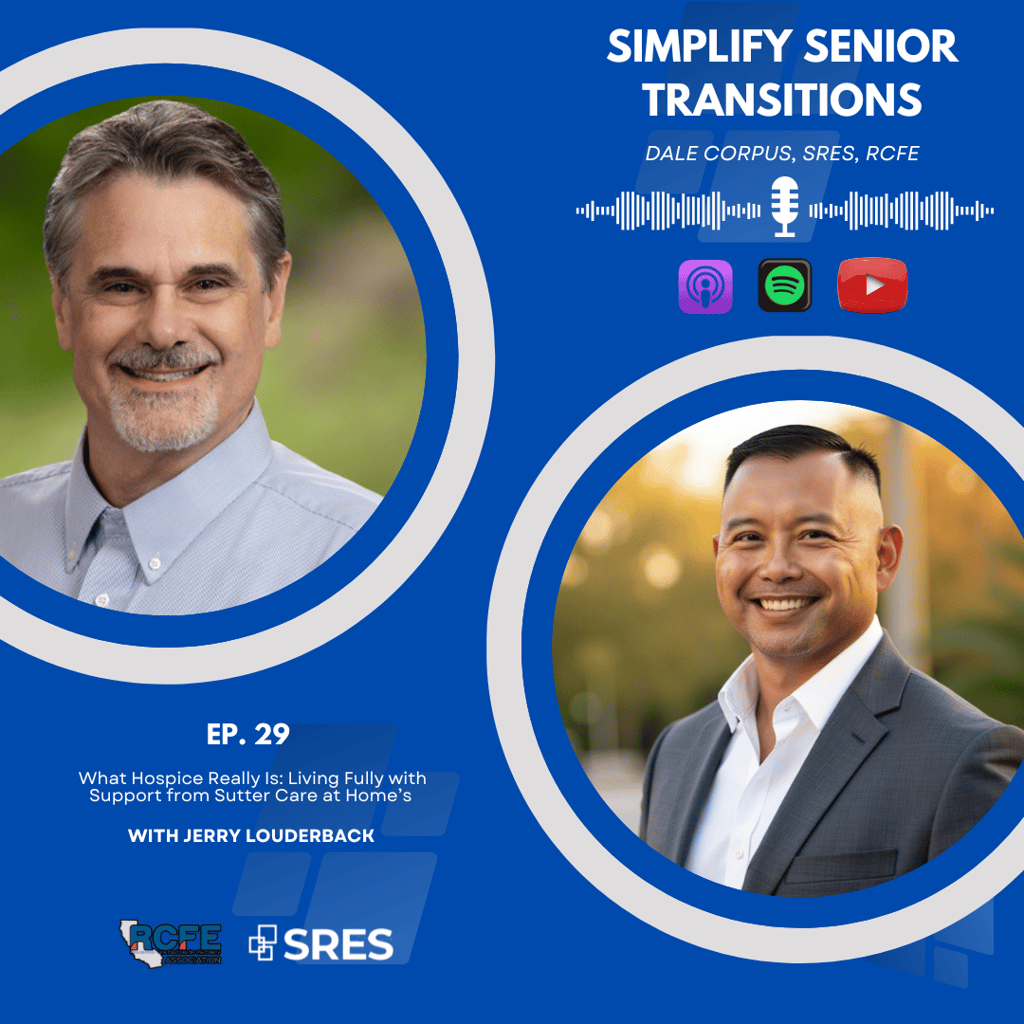Hospice Isn’t the End—It’s Support for Living Fully
Jerry Louderback shares how hospice empowers families with clarity, comfort, and care when it matters most.
Dale Corpus
6/24/20254 min read
Navigating Hospice: Living Fully with Support During Senior Transitions
As a senior transition specialist in the San Francisco Bay Area, I (Dale Corpus) often hear from adult children in the "sandwich generation" who are juggling their own families while also navigating complex care decisions for aging parents. It's overwhelming, and that's why this podcast exists: to bring in trusted professionals to answer the questions you didn't even know you had.
In a recent episode of the Simplify Senior Transitions podcast, we had an incredibly insightful conversation with Jerry Louderback, a hospice administrator at Sutter Care at Home. Jerry brings 25 years of experience supporting families during some of life's most vulnerable transitions, pulling back the curtain on what hospice truly is and how it works within a large healthcare system. His unique perspective helps clarify what hospice really means for a loved one, offering clarity, compassion, and real-world insights for caregivers, healthcare professionals, and anyone exploring these vital options.
Here's what you'll learn in this episode:
Hospice is a philosophy of care, not a physical place you go to. It comes to where the patient lives, whether that's their home, a skilled nursing facility, or an assisted living facility.
The benefits of early hospice enrollment, including building trust, better symptom management, and fostering relationships that allow for more meaningful living.
What Medicare and insurance typically cover for hospice services, medications, durable medical equipment, and supplies, and what they generally don't cover, such as long-term care facility stays.
Common misunderstandings about hospice, such as the belief that it shortens life (some studies show it can lengthen it!), that caregivers are expected to provide 24/7 care, or that patients must give up all other care and stay home.
The medical criteria for hospice eligibility, primarily an expectation that the patient is in the last six months of life, and how patients can even "graduate" from hospice and return later if needed.
The importance of having key legal documentation like a Durable Power of Attorney for Healthcare and a Physician Order for Life-Sustaining Treatment (POLST) in place.
How a large healthcare system like Sutter provides a continuum of care, allowing them to take on more complicated cases and offer deeper training for their teams.
Hospice: A Philosophy, Not a Final Destination
One of the biggest misconceptions Jerry dispelled is that hospice is a place. This often causes confusion for families, especially when they're already grappling with the idea of a loved one needing more specialized care or considering senior living options. Hospice is, in fact, a philosophy of care that focuses on improving the quality of life for patients and their families, wherever they call home. It's about supporting patients to live as fully as possible until they die, managing symptoms, and providing comprehensive support.
The Power of Early Enrollment
Families often wait until the very end to enroll in hospice due to denial, lack of understanding, or holding out hope for other treatments. However, Jerry emphasized that early enrollment makes all the difference. When patients come on hospice early, the team has time to build trust and develop human relationships with both the patient and their loved ones. This allows for much more effective symptom management, which significantly decreases stress for everyone involved. It also provides an opportunity to reassess medications, simplify care, and help patients achieve personal goals like reconnecting with loved ones.
Think of it like this: If you're planning a complex trip, would you rather start preparing at the last minute, or would you prefer to have months to organize, pack, and get comfortable with your itinerary? Early hospice enrollment is like having that extra time – it allows for a smoother, more supported journey for everyone involved.
Understanding the Support System
Hospice care involves an interdisciplinary team, ensuring all needs are met. This team typically includes:
Nurses (RN Case Managers) who are available 24/7 for crises or changes in condition. Visits are tailored to patient needs, often 1-3 times a week, but can be daily or as little as every 14 days.
Hospice Aides who assist with personal care like bathing.
Medical Social Workers who help with community resources, communication, and emotional support.
Chaplains who provide spiritual care for everyone, regardless of faith.
Volunteers who can offer companionship.
Bereavement programs that offer support for at least a year after a loved one passes, often extending to the community at large.
This comprehensive team helps manage physical, emotional, spiritual, and social needs, and can even provide respite care for overwhelmed family caregivers.
The Financials and Planning Ahead
Most hospice patients are covered by Medicare, which typically covers all hospice services, related medications, durable medical equipment (like hospital beds or oxygen), and supplies. However, it's crucial to understand that it does not cover the cost of living in a long-term care facility like a nursing home or assisted living facility. For those costs, families might rely on Medicaid, long-term care insurance, or private pay.
For planning, having a Durable Power of Attorney for Healthcare is essential to designate who makes medical decisions if the patient cannot. A POLST (Physician Order for Life-Sustaining Treatment), often a bright pink paper, details a patient's wishes, including "Do Not Resuscitate" orders, and must be signed by both the patient/responsible party and a physician in advance.
If you're looking for a hospice provider, Jerry advises trusting your gut. Red flags include a provider who doesn't listen, doesn't seem to understand your needs, or isn't available when you need them. Sutter, as a not-for-profit hospice, invests back into the community, taking on complex cases that others might not, and providing robust bereavement programs.
You Are Not Alone
The journey of helping an aging parent is incredibly challenging, whether it involves downsizing their home, finding the right senior living, or managing their care. As Jerry stated, "You're not alone. This is a very challenging time". Hospice specialists are experts in end-of-life care, helping you live the best today, plan for tomorrow, and navigate hard choices with a team of support in the comfort of your own home. It’s not about taking away or stopping; it’s about adding specialized support to help you and your loved one live fully.
Ready to simplify your senior transition? If your loved one is considering senior living and you need to figure out what to do with their home, let's talk! Schedule a FREE consultation with me by clicking here: www.simplifyseniortransitions.com.
Want to dive deeper into hospice care? Listen to the full episode with Jerry Louderback for even more insights. You can also contact me directly via Instagram @soldbydale.
P.S. Got news or an amazing story to share? Hit us up at dale.corpus@exprealty.com and you might be featured in our next episode! Remember, always check out the transcript for detailed insights. Happy listening!
Watch The Podcast Here



Transitions Made Simple
Helping seniors transition with ease and peace.
📍 Serving the San Francisco Bay Area
📞 GET IN TOUCH
📬 STAY INFORMED
Dale Corpus, SRES, RCFE
📱 925-380-1657
📧 dale@simplifyseniortransitions.com
🕓 Available for free 15 min consultations by appointment
© 2026. All rights reserved.
Sign up for monthly senior transition tips & real estate insights.
